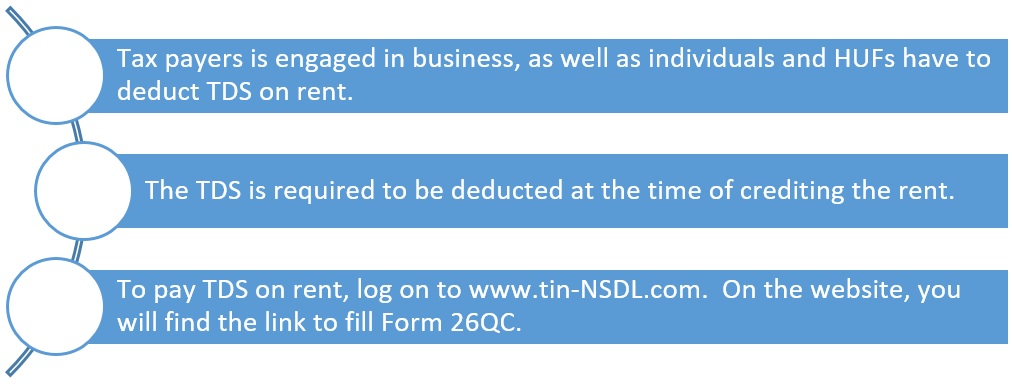Section 194I of Income Tax Act is applicable on a landlord earning a rental income from land, building, plant & machinery, furniture and fittings, etc. The responsibility to deduct the TDS (tax deducted at source) is on the tenant under this section.
All you want to know about rent receipt and its role in saving tax
TDS on rent under Section 194I
Section 1941 was inserted in the income tax law through the Finance Act, 1994, to cover rental income under the ambit of TDS payments. TDS on rent paid by a businessman is governed by Section 194I while TDS on rent paid by an individual or HUFs falls under Section 194IB of the law.
Conditions for TDS deduction on rent
Section 194I of the Income Tax Act says the tenant must deduct 10% TDS on rent generated from any land or building if the aggregate of the rent paid or likely to be paid during a financial year exceeds Rs 2.40 lakh. The limit of Rs 2.40 lakh is applicable for each payee and not for each of the properties. In case the owner of a property has let-out more than one property to the same lessee and the annual rent of these is less than Rs 2.40 lakh for each property annually but the aggregate of the rent is likely to exceed Rs 2.40 lakh, the lessee has to deduct the tax at source.
See also: Section 80GG is HRA is not part of your salary.
Tax (TDS) deduction rate on rent 2024
| Nature of payment | TDS on rent |
| Rent of plant and machinery | 2% |
| Rent of land or building or furniture or fittings | 10% (5% for Individuals and HUFs not liable for tax audit) |
See also: Revenue stamp on rent receipt: When is it needed?
Who is liable to deduct TDS on rent?
The present provisions are applicable to all tax payers, including companies, firms, trusts or association of persons, etc.
However, if the payer of rent is an individual or HUF, the provisions will apply if the payer of the rent is engaged in a business or profession and the accounts were required to be audited during the preceding year, due to the turnover being in excess of the prescribed limit.
Check out Housing.com’s rent receipt format
What happens if TDS is not deducted on rent?
If the TDS is not deducted, penalty interest at 1% is applicable per month till the TDS is deducted.
How is TDS on rent calculated?
Tenants are required to deduct TDS when the payment is being made to a resident landlord on rent payment exceeding Rs 2.40 lakh in a year.
If the landlord is a non-resident, the tenant has to deduct tax under the provisions of Section 195 of the Income Tax Act, without there being any threshold limit of Rs 2.40 lakh per annum.
The payment may be called by any name but the tax is required to be deducted in case the payment is for use of land, building or land and building.
Also, it is not necessary that the recipient of the rent should be the owner of the property. So, in case a lessee sublets the property taken by him on rent/lease to any other person, the sub-lessee has to deduct tax at source.
Likewise, tax is required to be deducted from payments made to hotels for providing rooms to you in case the rent is likely to exceed the limit during the year.

When is TDS deducted on rent?
The TDS is required to be deducted at the time of crediting the rent in its books of accounts even if the payment is made later. Likewise, you need to deduct the tax at the time of making an advance payment of such rent, either for the year or even in cases where the rent is paid in advance for more than one year. For payment of the TDS to the credit of the government, you need to obtain the tax deduction account number (TAN) and deposit the tax through the prescribed challan.
See also: All about TDS on sale of property
How to pay TDS on rent?
The tenant has to furnish information regarding the transaction online on the TIN website, www.tin-nsdl.com. After successfully providing details of transaction, he can either make the payment online through e-tax payment option immediately or make the payment subsequently through e-tax payment option (net-banking account) or by visiting any of the authorised bank branches. However, such bank branches will make e-payment without digitization of any challan. The bank will get the challan details from the online form filled on TIN website(www.tin-nsdl.com)
TDS deduction on rent paid by individuals and HUFs in 2024
| Rent payer | TDS rate | Threshold limit |
| Companies, firms, trusts or association of persons, etc., and individuals or HUFs, where the payer is engaged in a business whose accounts were audited | 10% of the rent. | TDS has to be deducted if the aggregate of the rent paid or likely to be paid during the year exceeds Rs 2.40 lakh |
| Individuals and HUFs not covered in the above section | 5% of the rent. | TDS has to be deducted if the rent for each month or part of the month is more than Rs 50,000. |
The payer is required to deduct tax only in the last month of the year or during the last month of tenancy in case the property is vacated during the year. However, in case the rent is paid earlier, you are required to deduct tax at the earlier moment.
So, with the new provisions, even the people who are salaried or retired and not carrying on any business or profession but are paying rent above Rs 50,000 per month, will have to deduct tax at source from such rental. This will bring those people into the tax net, who are earning rent by letting out the property to people who are not engaged in any business or profession.
Since the rent for this purpose includes any payment for use of building, this will even cover the rent paid by you to hotels for room bookings, or even to marriage halls, in case the rent for use of such premises exceeds Rs 50,000 even for one day.
TDS on rent paid to NRIs
According to Section 195 of the Income Tax Act, the tenant should deduct TDS at the rate of 30% on rent paid to an NRI landlord for property located in India. For deducting TDS on the rent, the tenant should have a TAN. If the tenant fails to deduct TDS on the rent paid to the NRI, the payer is liable to pay penalty as per the prevailing provisions.
Is TAN mandatory for TDS on rent?
Individual or HUFs need PAN to deduct and deposit TDS. Assessees other than individuals or HUFs need to have a TAN to deduct and deposit TDS.
Form for TDS payment
To pay TDS on rent, log on to www.tin-NSDL.com. On the website, you will find the link to fill Form 26QC. Fill all your details, the details pertaining to your landlord and all the details of the financial transaction. In case you are sharing the accommodation, their details must also be furnished. Similarly, if your landlord co-owns the property with someone else, their details must also be given in the form.
See also : Know everything about ITR filing last date
Must-know facts
What is TDS?
TDS is a type of income tax that is deducted by the person making the payment, on making certain payments. This means that the tax liability is on the person receiving the money in the transaction. TDS is basically a process under which tax is collected at the source from where an individual’s income is generated. TDS is levied on several incomes, including the rent that a landlord earns from his tenant, commission, professional fees, salary, interest, etc. know more about TDS payment here.
Under the income tax laws, different types of incomes attract different TDS rates. According to the Income Tax Department, the concept of TDS was introduced with an aim to collect tax from the very source of income. “As per this concept, a person who is liable to make payment of specified nature to any other person shall deduct tax at source and remit the same into the account of the central government. The deductee whose income tax has been deducted at source, would be entitled to get credit of the amount so deducted on the basis of Form 26AS or TDS certificate issued by the deductor,” it says.
What is an HUF?
According to the Hindu law, a Hindu undivided family or HUF, is a family that consists of all persons lineally descended from a common ancestor and includes their wives and unmarried daughters. An HUF arises from status and is neither the creation of law nor of a contract. An HUF is automatically formed when two people get married and start their family. Apart from Hindus, Sikhs, Buddhists, Jains, etc., can also form an HUF.
FAQs
What is Section 194I of the Income Tax Act?
Section 194I of the I-T Act deals with TDS on rent payments. Section 194I covers persons who are not individuals/HUFs, as well as individuals/HUFs who are liable to audit under Section 44AB (a) and (b). Section 194IB covers individuals and HUFs who are not liable to audit. Section 194IC covers joint development agreements.
Where can I pay TDS on rent?
Any individual or organisation that deducts TDS from rent, can deposit the same to the credit of the government, through the portal https://www.tin-nsdl.com/ or through authorised banks.
What is the meaning of 'rent' for TDS on rent?
Rent refers to any payment made for the use of land, building or land and building, or payments made to hotels for providing rooms.
What are the income tax forms for TDS on rent?
A tenant has to fill a challan-cum-statement (Form 26QC) on the TIN website for reporting the TDS on rent transaction.
What is the penalty for not deducting TDS on rent?
If the TDS is not deducted, penalty interest @ 1% shall be applicable per month, till the TDS is deducted.

An alumna of the Indian Institute of Mass Communication, Dhenkanal, Sunita Mishra brings over 16 years of expertise to the fields of legal matters, financial insights, and property market trends. Recognised for her ability to elucidate complex topics, her articles serve as a go-to resource for home buyers navigating intricate subjects. Through her extensive career, she has been associated with esteemed organisations like the Financial Express, Hindustan Times, Network18, All India Radio, and Business Standard.
In addition to her professional accomplishments, Sunita holds an MA degree in Sanskrit, with a specialisation in Indian Philosophy, from Delhi University. Outside of her work schedule, she likes to unwind by practising Yoga, and pursues her passion for travel.
[email protected]











